Tipu Sultan: a group of British newspapers, consisting of The Morning Post and Daily Advertiser, The Evening Mail, the Ipswich Journal, the London Chronicle, and the Sun, reporting on events relating to Haider 'Ali, Seringapatam and Tipu Sultan
London and Ipswich, between 1783 and 0ctober 1800consisting of: 14 editions of The Morning Post, and Daily Advertiser, 22nd July-28th November 1783; one edition of the Evening Mail, 22nd-25th April 1791; four editions of the Ipswich Journal, 12th January, 16th March, 10th August, and 5th October 1793; one edition of the London Chronicle, 22nd-24th April 1800; one edition of the Sun, 30th December 1793, each edition consisting of two conjoined leaves, four sides of text
500 x 345 mm. and slightly smaller(20)FootnotesThe Morning Post, and Daily Advertiser, 22nd July 1783: as a result of the arrival of a ship from Bengal, it is learned that Haider 'Ali, father of Tipu Sultan, died the previous December, and that 'Tippoo Saib had expressed his wishes for peace', p. 1, col. 4.
The Morning Post, and Daily Advertiser, 23rd July 1783: Tipu 'appeared more pacifically inclined towards the English than his father'; 'The death of Hyder Ally, our formidable and inveterate foe, is at last confirmed [...] it will require the calmest and most unprejudiced minds, to examine the state of our circumstances in that quarter of the globe. The removal of such a man from his office should not be a work of declamation', p. 1, col. 4, p. 2, col. 2.
The Morning Post, and Daily Advertiser, 24th July 1783: 'the death of Hyder Ally is one of those fortunate events which have often turned the tide of war [...] the security of our Asiatic settlements may probably depend upon the death of one man who was the very life and genius on which his numerous forces depended. The death of Hyder Ally has providentially rid us of the most formidable enemy to our Eastern possessions. Like Judas Maccabeus, we may now exultingly exclaim, "Fallen is the foe!", nor would it degrade us in the esteem of reason, were we to ascribe our political deliverance to the guidance of that unseen hand, which conducts the seemingly fortuitous course of events for the benefit or destruction of Empires', p. 1, col. 4.
The Morning Post, and Daily Advertiser, 28th July 1783: 'The son of Hyder Ally, like the son of Oliver Cromwell, is neither a statesman or a general [...] the history of the war is by no means favourable to his military character'; in an engagement with a British unit, Tipu did not perform well: 'for having been twice repulsed, Hyder was so enraged, that he told him, if he did not succeed in this third attack and returned alive, he would strike off his head with his sabre. The alternative was desperate, and he conquered', p. 2, col. 4.
The Morning Post, and Daily Advertiser, 8th August 1783: 'The letters from the East Indies, by the Danish Indiaman, are full of the most favourable intelligence. They confirm the former accounts of the Mahratta peace, the death of Hyder Ally, the pacific disposition of Tipoo Saib, and the general aversion of the country powers, the Raja and Tanjore excepted, to the French interest. They mention likewise the flourishing state of the Company's commercial concerns, owing to the wise regulations and vigorous exertions of the Governor-General and Supreme Council', p. 2, col. 2.
The Morning Post, and Daily Advertiser, 27th August 1783: intelligence circulating from India: 'When Hyder Ally died, his death was kept a secret for six weeks, under an apprehension that it would have very pernicious effects among his forces'; and in fact when it was known, 'great numbers of the seapoys immediately deserted'. The text of a letter from the French is quoted, giving no very great opinion of Tipu; 'yet it is now held forth, that Tippoo Saib (who is suddenly become a great general) is preparing to follow, and execute all the schemes laid down by his father; and that the French interest revives in a very glorious manner in India. - Credat Judaeus!, p. 3, col. 1.
The Morning Post, and Daily Advertiser, 5th September 1783: 'It appears from the last East-India accounts, that since the death of Hyder Ally, near ten thousand horse had deserted from the army of his son, and more were daily following the example for lack of pay', p. 2, col. 2.
The Morning Post, and Daily Advertiser, 19th September 1783: Mongalore taken by the Company's forces on 5th January: one of the principal settlements in Hyder Ally's country, but not his capital, which is called Seringa Patnam [sic], from which however it is distant only about sixty miles', p. 2, col. 2.
The Morning Post, and Daily Advertiser, 23rd September 1783: a long article, derived from the India Gazette, Calcutta, 22nd March. Successful British operations against Tipu in the Bedanore region, although 'there is still talk of peace with Tippoo'. Naval operations against the French in south India, p. 2, col. 3 & 4.
The Morning Post, and Daily Advertiser, 25th September 1783: two columns given over to the full text of the Mahratta Peace Treaty between the Company and Rao Scindia, concluded on 17th May 1782, p. 2, col. 4, p. 3, col. 1.
The Morning Post, and Daily Advertiser, 27th September 1783: an article derived from the India Gazette, Calcutta, Feb-March-April, and a report from Madras from March - that there had been an uprising againt Tipu (apparently by members of his father's family), who had left Seringapatam along with some French. British prisoners had as a result been released. 'The particulars of this important news are not yet received, but hourly expected', p. 2, col. 3.
The Morning Post, and Daily Advertiser, 26th November 1783: four columns in total, comprising an extract from a letter from the President of the Company's Committee at Bombay, to the Secret Committee of the Court of Directors of the East India Company, June 1783. Successes of General Matthews in the region of Bednore. Unfortunate serious disagreements between the General and some of his officers, who were 'zealots for plunder and booty', with 'the troops in Bednore almost in a state of mutiny' and 'the enemy collecting a force within thirty miles'. For complex reasons, General Matthews was relieved of his command in one region and was replaced by Lt. Col. Macleod. An engagement at sea with the Mahrattas, despite peace supposedly having been concluded. In March Tipu had suddenly moved his troops out of the Carnatic with hostile intent, and then defeated a British force. General Matthews and his force captured by Tipu, p. 1, col. 3 & 4, p. 2, col. 1 & 2.
The Morning Post, and Daily Advertiser, 28th November 1783: a column with something of the tone of what would now be called a sketch or opinion article. '[N]othing could exceed the indignation expressed by the impartial public at the miserable deceptions which had been attempted by the faction who write in behalf of the East India delinquents. What a picture of discord, rapine, and confusion! Settlement against settlement! Generals accusing their armies! Governors accusing their generals! The King's troops and those of the Company at open enmity! [...] Commanders holding up treasure and jewels to the eyes of their troops, and then falling to loggerheads with them in dividing the booty! While Tippoo, with an army of 100,000 fighting men, is carrying him all before him, and appears indeed likely to prove the decisive avenger of his country! - O wretched ignoble Britain! thy sun of glory begins to set indeed! Thy Western Empire is gone, Ireland has deserted thee, and now a few cant words, and a little political jargon, is attempting to fright us from attempting to save the one jewel we have left! The single prop of our declining greatness! and only remaining resource from which the shattered remains of this country can look for a distant relief! But thank the fortune of the day, there is a something of vigour and determination in our Ministers - Let them proceed with firmness, nothwithstanding the clamour of culprits and the tricks of faction: - The nation is with them. Let but the men whom they name to execute their plan, be worthy of the confidence of the public, and they will fix themselves in the hearts of all true Englishmen', p. 3, col. 3.
Evening Mail, 22nd-25th April 1791: East India News, including a Frenchman in Tipu's service captured, and one of his commanders; other news from Bombay, Calcutta, p. 2, col. 2&3.
Ipswich Journal, 12th January 1793: 'A letter lately arrived from Madras, says, The sons of Tippoo travelled to this place on elephants', and visited Earl Cornwallis and Lady Oakley, whom they complimented on her beauty, p. 4, col. 3.
Ipswich Journal, 16th March 1793: 'Tippoo is so humbled, that peace may be expected for a long period [...] Another payment of the Seringapatam money has been made, and it is supposed the young hostages will soon be redeemed. In the meantime they appear perfectly happy, have an excellent town and country house, attend assemblies, &C., p. 2, col. 2.
Ipswich Journal, 10th August 1793: 'Tippoo's second payment was on the road to Madras', p. 2, col. 3.
Ipswich Journal, 5th October 1793: 'Tipoo Saib had just completed his last payment, when the 2 last ships sailed from Madras; and his 2 sons were accordingly delivered to him', p. 2, col. 2.
The Sun, 30th December 1793: Siege of Pondicherry, news from Madras from August, British attempts to capture the French colony, p. 2, col. 1.
The London Chronicle, 22nd-24th April 1800: Capture of Seringapatam. Some curious Particulars relative to the Capture of Seringapatam. By an Officer of the Army before that place., p. 2, col. 2&3.
Tipu Sultan: a group of British newspapers, consisting of The Morning Post and Daily Advertiser, The Evening Mail, the Ipswich Journal, the London Chronicle, and the Sun, reporting on events relating to Haider 'Ali, Seringapatam and Tipu Sultan
London and Ipswich, between 1783 and 0ctober 1800consisting of: 14 editions of The Morning Post, and Daily Advertiser, 22nd July-28th November 1783; one edition of the Evening Mail, 22nd-25th April 1791; four editions of the Ipswich Journal, 12th January, 16th March, 10th August, and 5th October 1793; one edition of the London Chronicle, 22nd-24th April 1800; one edition of the Sun, 30th December 1793, each edition consisting of two conjoined leaves, four sides of text
500 x 345 mm. and slightly smaller(20)FootnotesThe Morning Post, and Daily Advertiser, 22nd July 1783: as a result of the arrival of a ship from Bengal, it is learned that Haider 'Ali, father of Tipu Sultan, died the previous December, and that 'Tippoo Saib had expressed his wishes for peace', p. 1, col. 4.
The Morning Post, and Daily Advertiser, 23rd July 1783: Tipu 'appeared more pacifically inclined towards the English than his father'; 'The death of Hyder Ally, our formidable and inveterate foe, is at last confirmed [...] it will require the calmest and most unprejudiced minds, to examine the state of our circumstances in that quarter of the globe. The removal of such a man from his office should not be a work of declamation', p. 1, col. 4, p. 2, col. 2.
The Morning Post, and Daily Advertiser, 24th July 1783: 'the death of Hyder Ally is one of those fortunate events which have often turned the tide of war [...] the security of our Asiatic settlements may probably depend upon the death of one man who was the very life and genius on which his numerous forces depended. The death of Hyder Ally has providentially rid us of the most formidable enemy to our Eastern possessions. Like Judas Maccabeus, we may now exultingly exclaim, "Fallen is the foe!", nor would it degrade us in the esteem of reason, were we to ascribe our political deliverance to the guidance of that unseen hand, which conducts the seemingly fortuitous course of events for the benefit or destruction of Empires', p. 1, col. 4.
The Morning Post, and Daily Advertiser, 28th July 1783: 'The son of Hyder Ally, like the son of Oliver Cromwell, is neither a statesman or a general [...] the history of the war is by no means favourable to his military character'; in an engagement with a British unit, Tipu did not perform well: 'for having been twice repulsed, Hyder was so enraged, that he told him, if he did not succeed in this third attack and returned alive, he would strike off his head with his sabre. The alternative was desperate, and he conquered', p. 2, col. 4.
The Morning Post, and Daily Advertiser, 8th August 1783: 'The letters from the East Indies, by the Danish Indiaman, are full of the most favourable intelligence. They confirm the former accounts of the Mahratta peace, the death of Hyder Ally, the pacific disposition of Tipoo Saib, and the general aversion of the country powers, the Raja and Tanjore excepted, to the French interest. They mention likewise the flourishing state of the Company's commercial concerns, owing to the wise regulations and vigorous exertions of the Governor-General and Supreme Council', p. 2, col. 2.
The Morning Post, and Daily Advertiser, 27th August 1783: intelligence circulating from India: 'When Hyder Ally died, his death was kept a secret for six weeks, under an apprehension that it would have very pernicious effects among his forces'; and in fact when it was known, 'great numbers of the seapoys immediately deserted'. The text of a letter from the French is quoted, giving no very great opinion of Tipu; 'yet it is now held forth, that Tippoo Saib (who is suddenly become a great general) is preparing to follow, and execute all the schemes laid down by his father; and that the French interest revives in a very glorious manner in India. - Credat Judaeus!, p. 3, col. 1.
The Morning Post, and Daily Advertiser, 5th September 1783: 'It appears from the last East-India accounts, that since the death of Hyder Ally, near ten thousand horse had deserted from the army of his son, and more were daily following the example for lack of pay', p. 2, col. 2.
The Morning Post, and Daily Advertiser, 19th September 1783: Mongalore taken by the Company's forces on 5th January: one of the principal settlements in Hyder Ally's country, but not his capital, which is called Seringa Patnam [sic], from which however it is distant only about sixty miles', p. 2, col. 2.
The Morning Post, and Daily Advertiser, 23rd September 1783: a long article, derived from the India Gazette, Calcutta, 22nd March. Successful British operations against Tipu in the Bedanore region, although 'there is still talk of peace with Tippoo'. Naval operations against the French in south India, p. 2, col. 3 & 4.
The Morning Post, and Daily Advertiser, 25th September 1783: two columns given over to the full text of the Mahratta Peace Treaty between the Company and Rao Scindia, concluded on 17th May 1782, p. 2, col. 4, p. 3, col. 1.
The Morning Post, and Daily Advertiser, 27th September 1783: an article derived from the India Gazette, Calcutta, Feb-March-April, and a report from Madras from March - that there had been an uprising againt Tipu (apparently by members of his father's family), who had left Seringapatam along with some French. British prisoners had as a result been released. 'The particulars of this important news are not yet received, but hourly expected', p. 2, col. 3.
The Morning Post, and Daily Advertiser, 26th November 1783: four columns in total, comprising an extract from a letter from the President of the Company's Committee at Bombay, to the Secret Committee of the Court of Directors of the East India Company, June 1783. Successes of General Matthews in the region of Bednore. Unfortunate serious disagreements between the General and some of his officers, who were 'zealots for plunder and booty', with 'the troops in Bednore almost in a state of mutiny' and 'the enemy collecting a force within thirty miles'. For complex reasons, General Matthews was relieved of his command in one region and was replaced by Lt. Col. Macleod. An engagement at sea with the Mahrattas, despite peace supposedly having been concluded. In March Tipu had suddenly moved his troops out of the Carnatic with hostile intent, and then defeated a British force. General Matthews and his force captured by Tipu, p. 1, col. 3 & 4, p. 2, col. 1 & 2.
The Morning Post, and Daily Advertiser, 28th November 1783: a column with something of the tone of what would now be called a sketch or opinion article. '[N]othing could exceed the indignation expressed by the impartial public at the miserable deceptions which had been attempted by the faction who write in behalf of the East India delinquents. What a picture of discord, rapine, and confusion! Settlement against settlement! Generals accusing their armies! Governors accusing their generals! The King's troops and those of the Company at open enmity! [...] Commanders holding up treasure and jewels to the eyes of their troops, and then falling to loggerheads with them in dividing the booty! While Tippoo, with an army of 100,000 fighting men, is carrying him all before him, and appears indeed likely to prove the decisive avenger of his country! - O wretched ignoble Britain! thy sun of glory begins to set indeed! Thy Western Empire is gone, Ireland has deserted thee, and now a few cant words, and a little political jargon, is attempting to fright us from attempting to save the one jewel we have left! The single prop of our declining greatness! and only remaining resource from which the shattered remains of this country can look for a distant relief! But thank the fortune of the day, there is a something of vigour and determination in our Ministers - Let them proceed with firmness, nothwithstanding the clamour of culprits and the tricks of faction: - The nation is with them. Let but the men whom they name to execute their plan, be worthy of the confidence of the public, and they will fix themselves in the hearts of all true Englishmen', p. 3, col. 3.
Evening Mail, 22nd-25th April 1791: East India News, including a Frenchman in Tipu's service captured, and one of his commanders; other news from Bombay, Calcutta, p. 2, col. 2&3.
Ipswich Journal, 12th January 1793: 'A letter lately arrived from Madras, says, The sons of Tippoo travelled to this place on elephants', and visited Earl Cornwallis and Lady Oakley, whom they complimented on her beauty, p. 4, col. 3.
Ipswich Journal, 16th March 1793: 'Tippoo is so humbled, that peace may be expected for a long period [...] Another payment of the Seringapatam money has been made, and it is supposed the young hostages will soon be redeemed. In the meantime they appear perfectly happy, have an excellent town and country house, attend assemblies, &C., p. 2, col. 2.
Ipswich Journal, 10th August 1793: 'Tippoo's second payment was on the road to Madras', p. 2, col. 3.
Ipswich Journal, 5th October 1793: 'Tipoo Saib had just completed his last payment, when the 2 last ships sailed from Madras; and his 2 sons were accordingly delivered to him', p. 2, col. 2.
The Sun, 30th December 1793: Siege of Pondicherry, news from Madras from August, British attempts to capture the French colony, p. 2, col. 1.
The London Chronicle, 22nd-24th April 1800: Capture of Seringapatam. Some curious Particulars relative to the Capture of Seringapatam. By an Officer of the Army before that place., p. 2, col. 2&3.
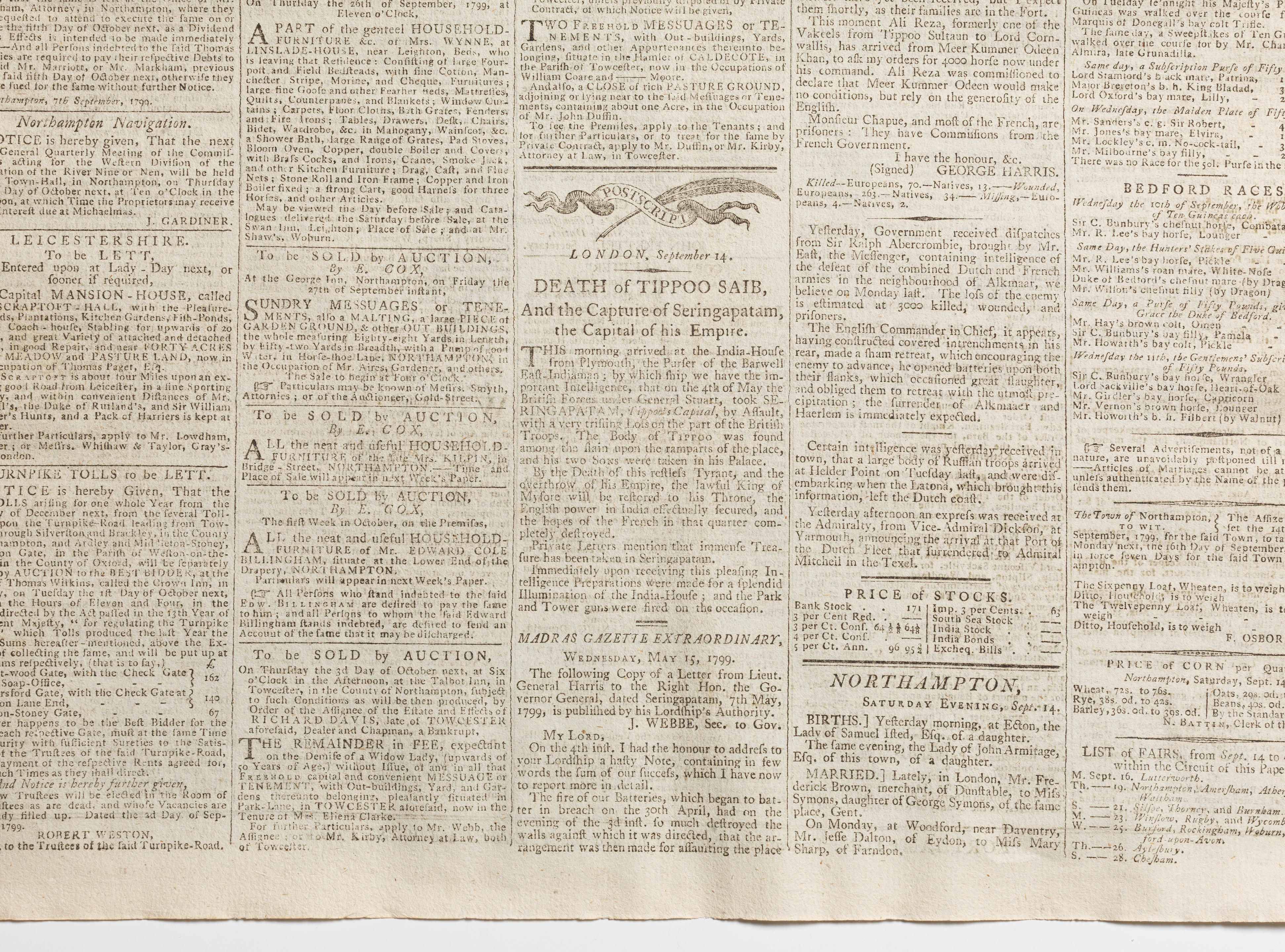


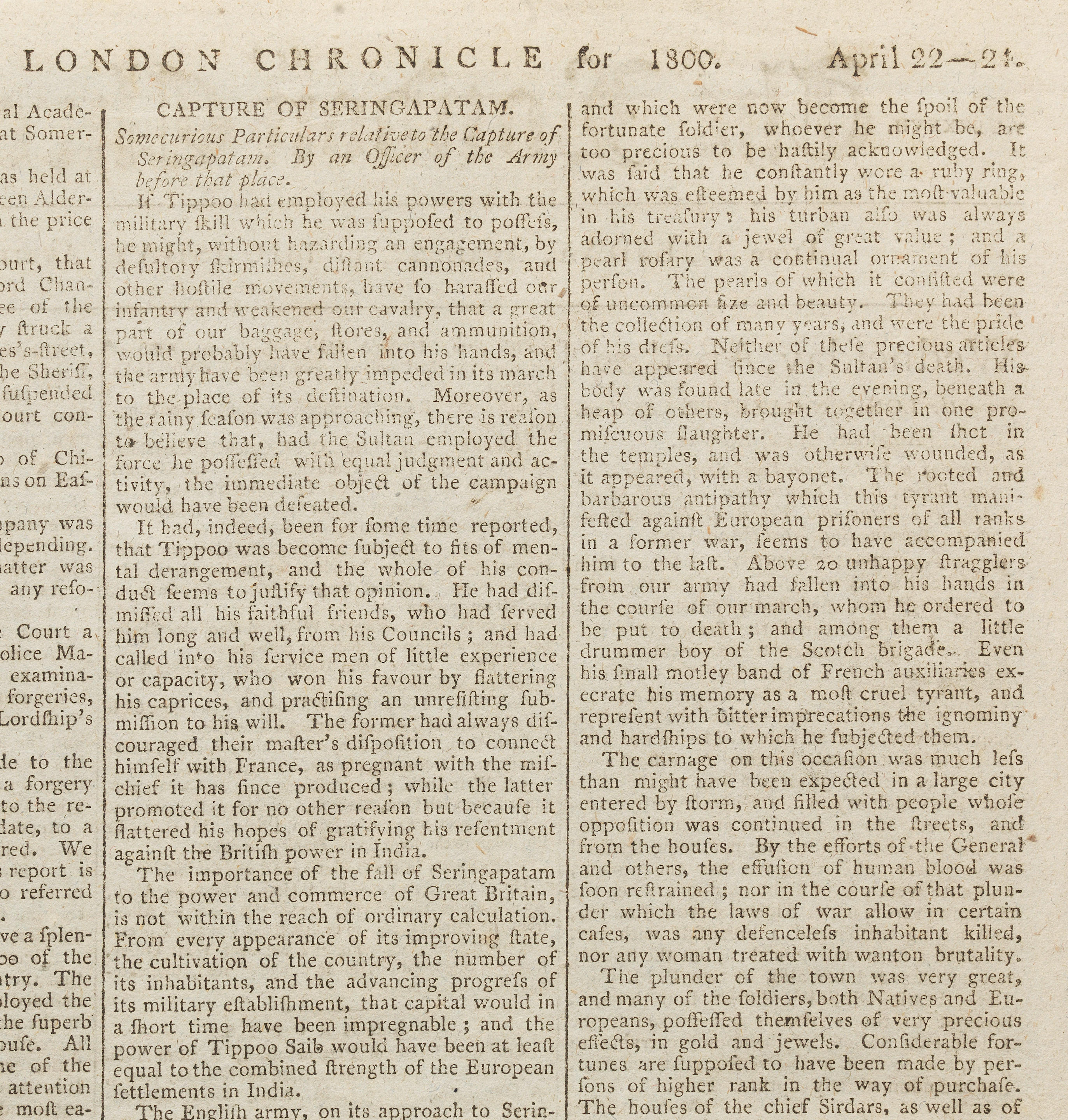
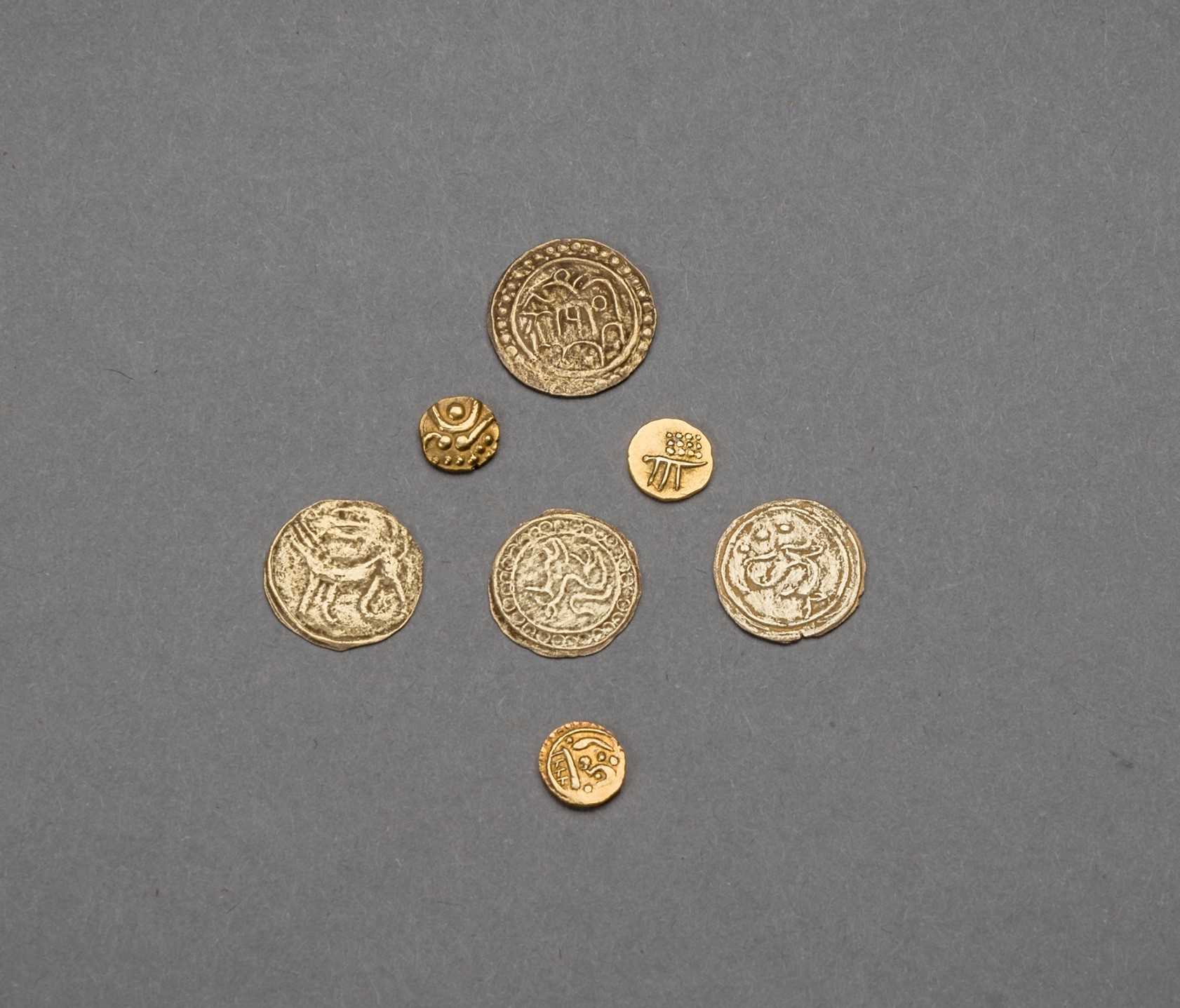
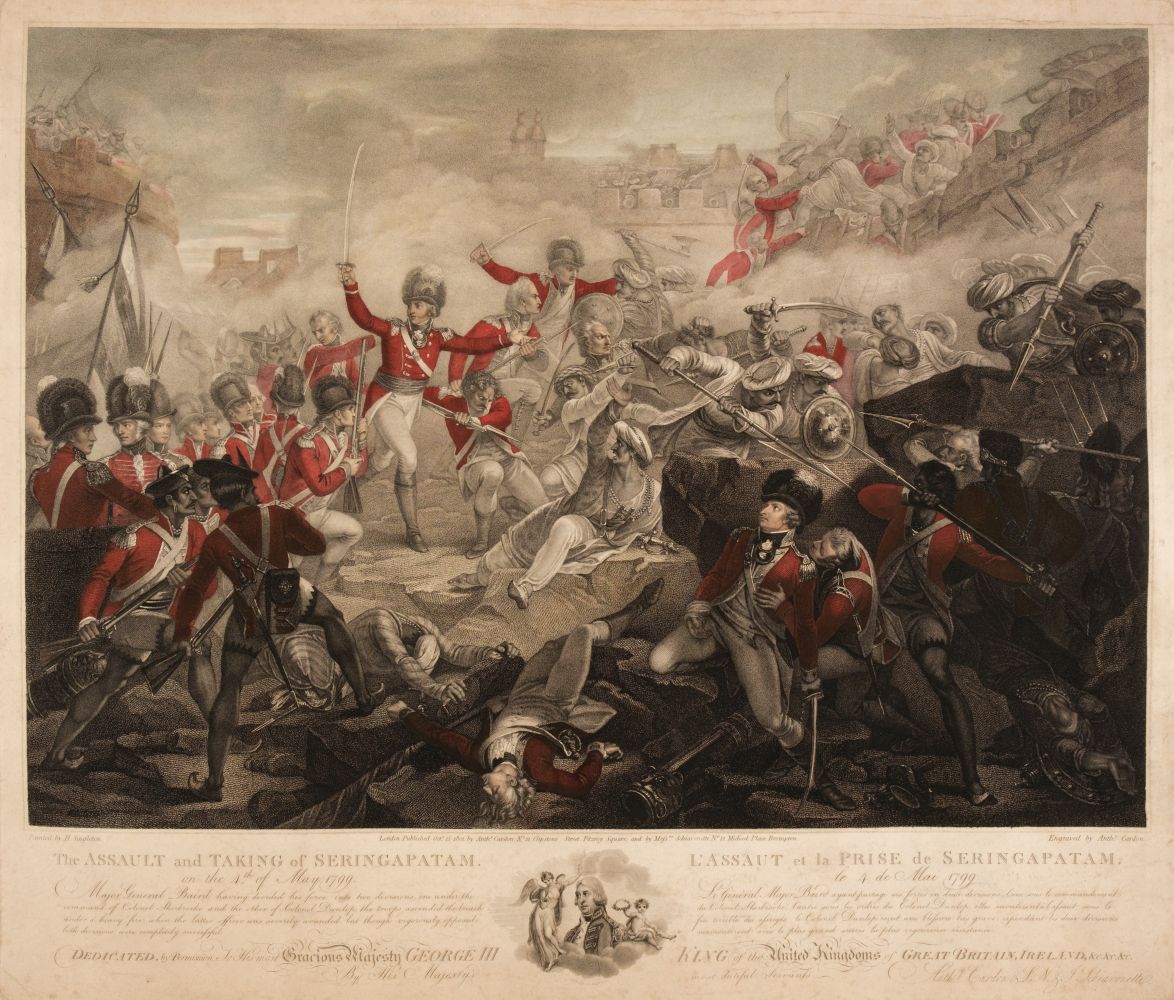


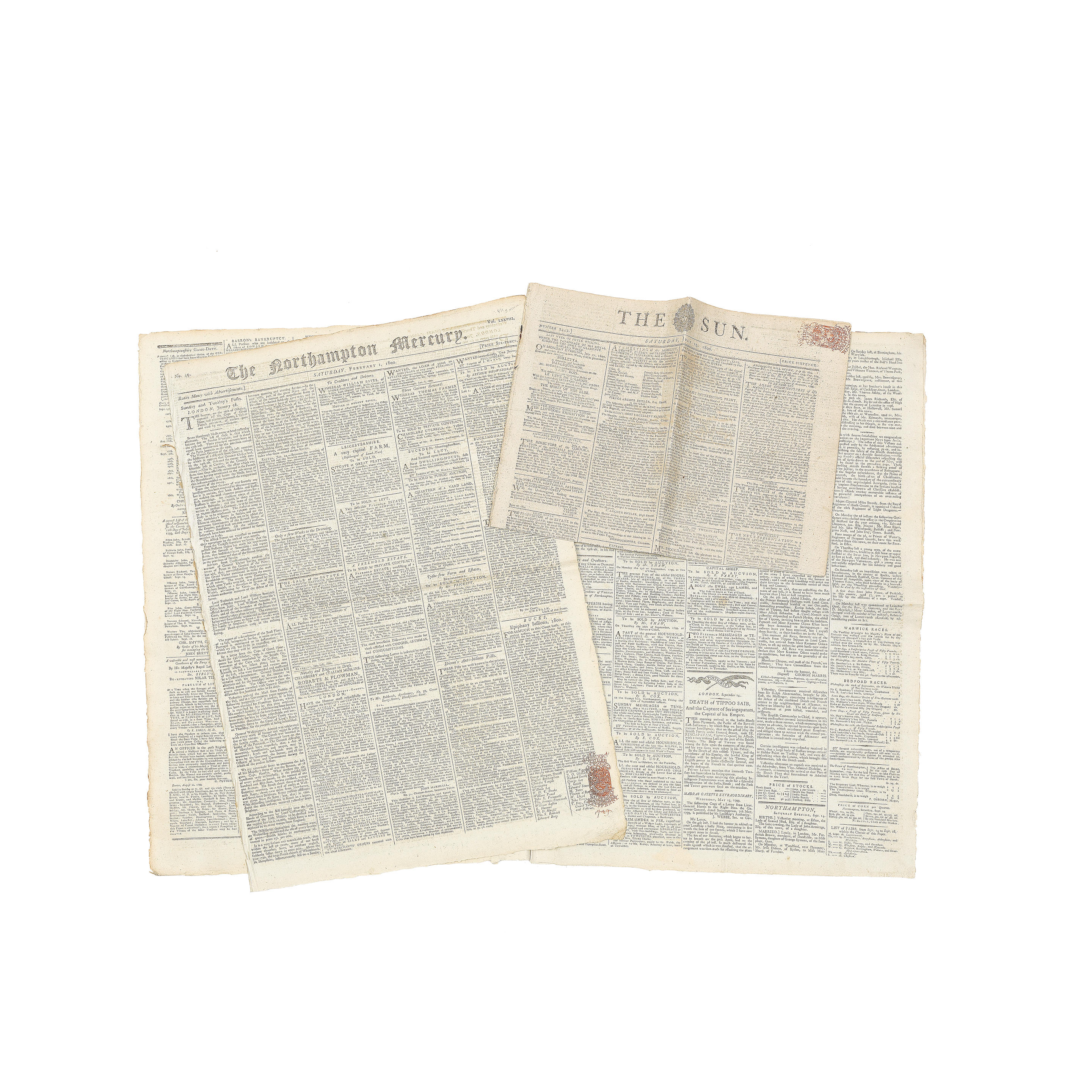
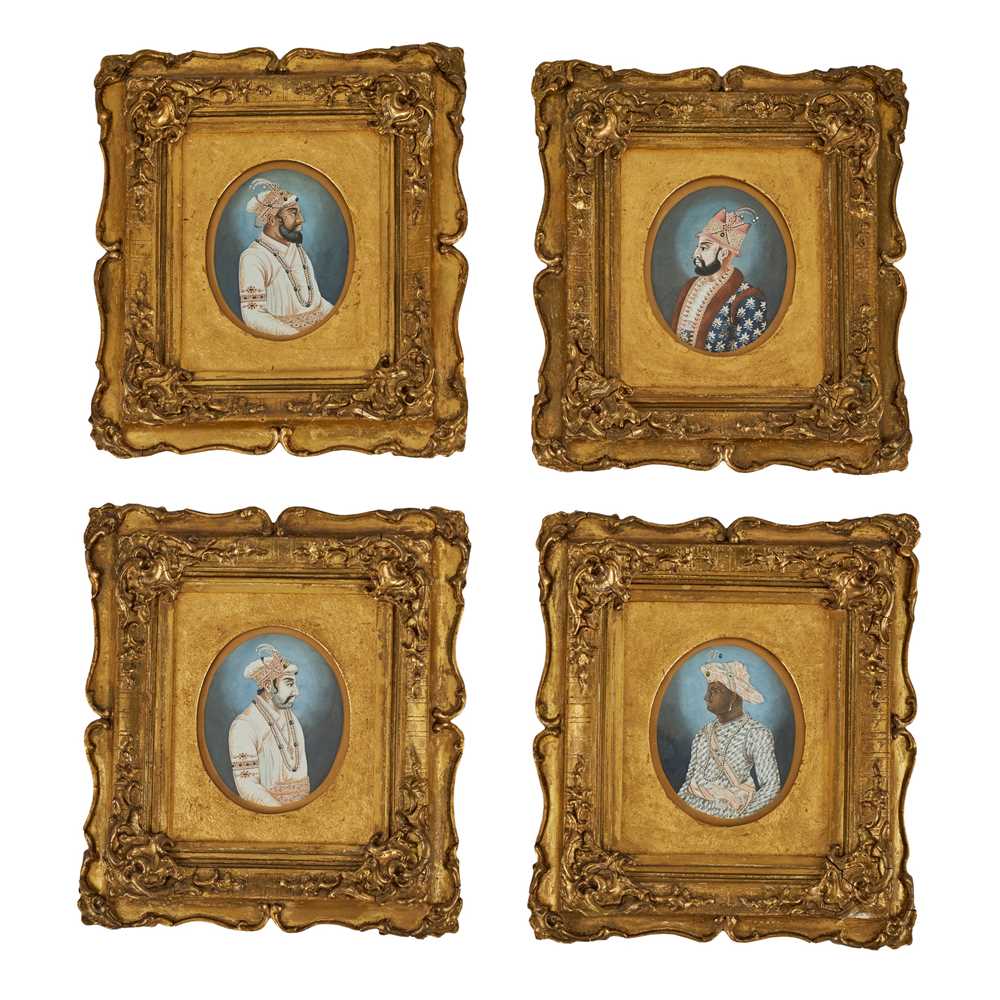
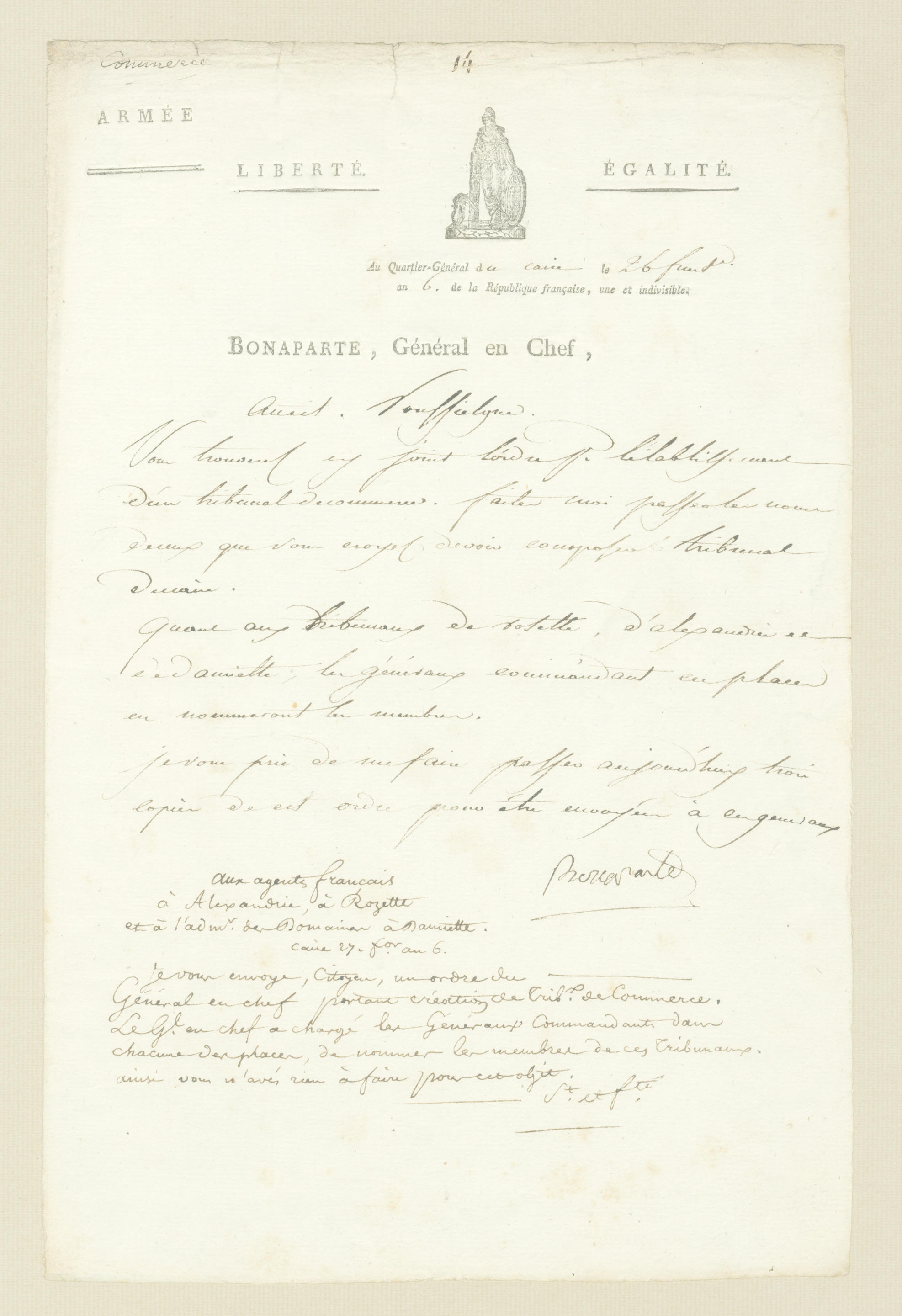
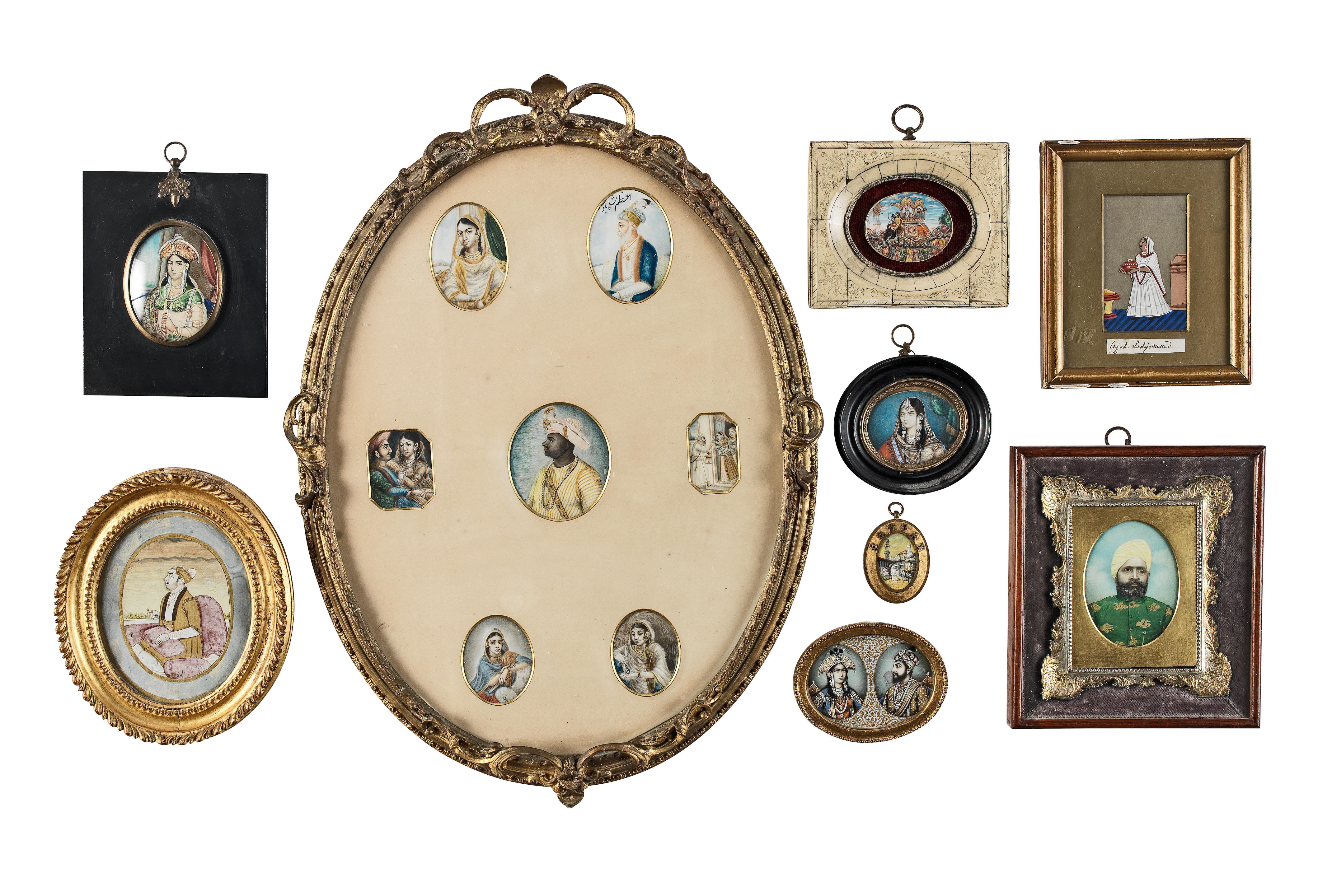
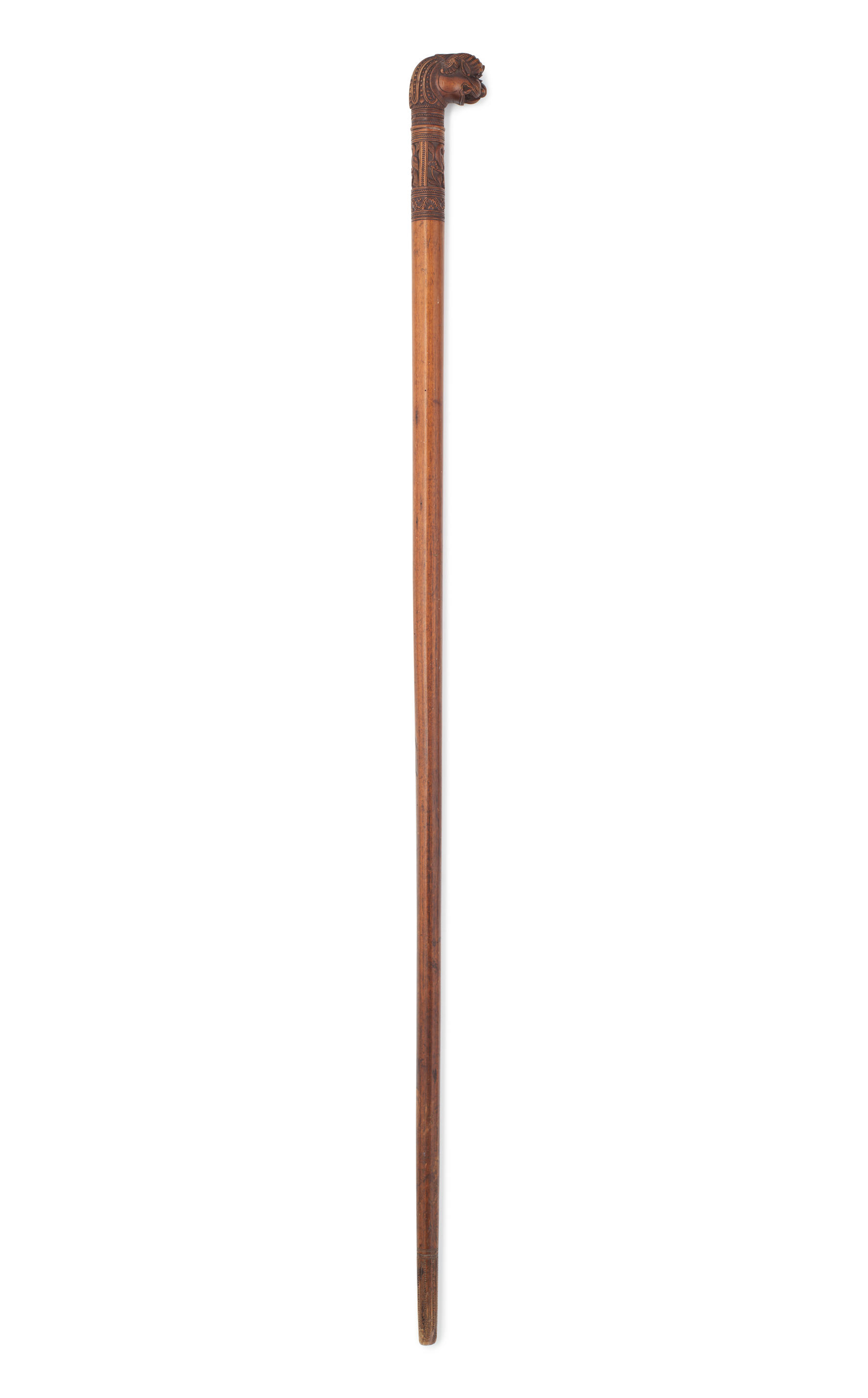
Testen Sie LotSearch und seine Premium-Features 7 Tage - ohne Kosten!
Lassen Sie sich automatisch über neue Objekte in kommenden Auktionen benachrichtigen.
Suchauftrag anlegen